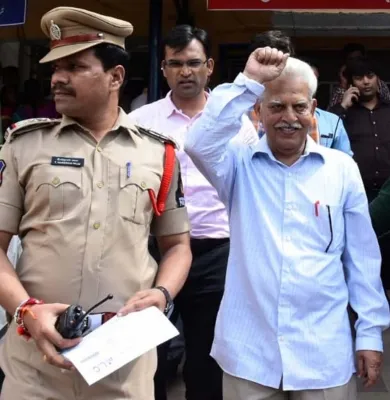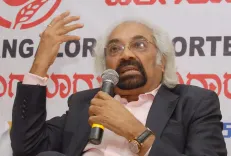Why Did the Supreme Court Deny Varavara Rao’s Bail Condition Relaxation?

Synopsis
Key Takeaways
- Supreme Court denies request to relax bail conditions for P. Varavara Rao.
- Rao has been on bail for four years due to health issues.
- The court emphasizes the importance of adhering to bail conditions.
- Concerns about the treatment of elderly activists in legal cases are highlighted.
- Rao's medical expenses exceed his pension, raising humanitarian concerns.
New Delhi, Sep 19 (NationPress) The Supreme Court has dismissed an application from P. Varavara Rao, an 85-year-old poet and activist facing charges in the Bhima Koregaon case, who sought to amend his bail conditions that necessitate prior approval from the trial court before leaving the Greater Mumbai area.
During the hearing, senior advocate Anand Grover, representing Rao, argued that his client has remained on bail for the past four years and is currently without family support in Mumbai after his wife relocated to Hyderabad.
“He collapsed due to dizziness today,” Grover expressed to the Supreme Court, noting that while Rao receives complimentary healthcare in Telangana, his medical expenses in Mumbai surpass his monthly pension.
Justice Maheshwari, leading the Bench, indicated, “The government will manage his health….we are not inclined to consider this application.”
Recognizing the court's reluctance to proceed, Grover requested to withdraw the application, a move the Bench approved—though without granting explicit permission to refile the request later.
In August 2022, the Supreme Court had granted Rao permanent bail on medical grounds, countering the NIA's objection that neither age nor health conditions should influence bail for a UAPA (Unlawful Activities (Prevention) Act) accused.
The court stipulated that Rao must remain within Greater Mumbai unless the trial court permits otherwise, avoid contacting witnesses, and refrain from interfering in the investigation.
“Any violation of these conditions will result in the revocation of bail,” the Supreme Court clarified, emphasizing that bail was granted solely on health grounds and did not comment on the case's merits.
It further stated, “The appellant is entitled to choose his medical attention but must keep the respondent authorities informed of any developments, including the medical care he receives.”








